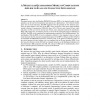Free Online Productivity Tools
i2Speak
i2Symbol
i2OCR
iTex2Img
iWeb2Print
iWeb2Shot
i2Type
iPdf2Split
iPdf2Merge
i2Bopomofo
i2Arabic
i2Style
i2Image
i2PDF
iLatex2Rtf
Sci2ools
IPPS
1998
IEEE
1998
IEEE
A Molecular Quasi-Random Model of Computations Applied to Evaluate Collective Intelligence
The paper presents how the Random PROLOG Processor (RPP), a bio-inspired model of computations, can be used for formalization and analysis of a phenomenon - the Collective Intelligence (CI) of social structures. The RPP originates from the question of why inference processes are quasi-chaotic in real life. In the RPP, clause_molecules (CMs) move quasi-randomly n abstract Computational_PROLOG_Space (CS). CMs can carry clauses of facts, rules, and goals, or CMs can even be moving sets of facts, rules, and goals enclosed by membranes. When CMs rendezvous, an inference process can occur iff the prerequisite logical conditions are fulfilled. The RPP can be considered an implementation proposal of the NonDeterministic Turing Machine. With the RPP, CI can be evaluated as follows: 1) the mapping is done of a given social structure into the structured computational space of the RPP; 2) beings and their behavior are translated into PROLOG expressions, carried by CMs; 3) the global or temporary ...
Distributed And Parallel Computing | IPPS 1998 | Prerequisite Logical Conditions | Random PROLOG Processor | Social Structure |
Related Content
| Added | 05 Aug 2010 |
| Updated | 05 Aug 2010 |
| Type | Conference |
| Year | 1998 |
| Where | IPPS |
| Authors | Tadeusz Szuba |
Comments (0)

